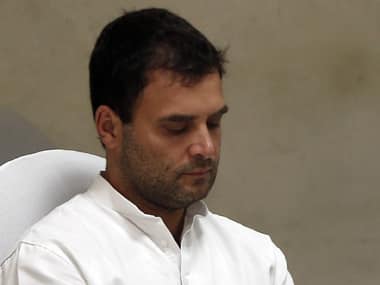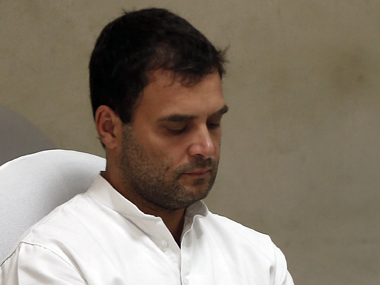Rahul Gandhi seems a person who either can’t read the writing on the wall or who can but who will not, in sheer stubbornness, act on its message. And the message, loud and clear, is: he must apologise for the anti-Sikh riots of 1984, more aptly classified as a pogrom. Not only is an apology a moral imperative, this gesture might help Rahul to resurrect his career and his party. Otherwise every Oct 31, as it has been happening over the last three decades, the Congress will be justifiably reminded of its duplicitous role in fomenting the riots and sabotaging the attempts to provide justice to its victims. This reminder will have a sharper sting than before over the next four years of Prime Minister Narendra Modi’s tenure. This year, for instance, he linked communal riots to an attack on the country’s unity and announced monetary compensation for the survivors of those who perished in the 1984 riots. [caption id=“attachment_1785263” align=“alignleft” width=“380” class=" “]  Rahul Gandhi. Reuters/File photo[/caption] The demand to apologise might seem unjust to Rahul because no such pressure is being mounted on Modi, who was chief minister in 2002 when Gujarat witnessed the 1984-type pogrom. Not only has he refused to apologise for it, he has become the country’s prime minister. Why must then Rahul apologise for the 1984 riots? There are six reasons why he should repent and atone. One: No doubt, he was a tender 14-year-old in 1984; his father was Prime Minister, not him. We can’t ask a son to account for his father’s mistakes or failings. But this rule doesn’t apply to Rahul because he is a dynast, anointed vice-president because of his birth. You can’t inherit the advantages accruing from family legacy but disown its disadvantages. It is Rahul’s responsibility, therefore, to bring a closure to the 1984 riots, to ensure its ghosts don’t haunt the party. Apology is indeed an honourable method of achieving this goal. Two: Unlike the RSS and its countless mutants, the Congress has ideologically believed in an inclusive India, in which caste-religious-linguistic identities co-exist with the national identity. Not for the Congress party the idea that India is Hindu, not for it the notion of building a nation through assimilation that dissolves all other identities. By contrast, the Sangh perceives India to be Hindu, evident even now through the speeches of its chief, Mohan Bhagwat. It believes the minorities are innately disloyal to India and, therefore, must be assimilated in a way that deprives them of their religious identity or they must accept the status of second class citizen. It is this worldview of the Sangh which has it baiting the minorities every time it is in power, manifest in the tension its cadres have been fanning in India over the last five months. The Gujarat riots of 2002 are an extreme expression of the Sangh’s prejudicial politics. In contrast, the anti-Sikh riots of 1984 testify to the hypocrisy of the Congress, to the betrayal of its own ideology. Rahul’s apology will help address the charge of duplicity levelled against his party. Three: His apology will also deprive the BJP of one of the two justifications it invokes to justify 2002. It projects the riots as a spontaneous reaction to the burning of kar sevaks travelling on the train in Godhra. Second, it has tried to diminish the horrific dimensions of 2002 through a comparison with 1984. The subtext of this comparison is: the BJP government isn’t the only one to have failed to check a riot. You can’t condone the Congress’s complicity in the 1984 riots and condemn Modi’s in 2002, the BJP argues. In apologising, not only would Rahul weaken the idea of moral relativity, he might succeed in mounting pressure on his political rival to think of a similar response. In case Modi doesn’t follow suit, Rahul stands to gain. In case he does, India stands to gain and the idea of plurality a boost. Four: Rahul should know that the violence against Sikhs in 1984 had a more telling impact on the national psyche than all the Hindu-Muslim violence post-Independence. Undoubtedly, it is a politically incorrect assertion, but has an element of truth. Communal violence before India’s Independence, the separatist politics of the Muslim League, and the bloody history of Partition have all been harnessed to stereotype the Muslims and spawn a culture of justification for perpetrating violence against the Muslims. Despite the unconscionable nature of the Gujarat riots, it wasn’t a shocking exception, but one more addition to the long list of the government’s culpability in the Hindu-Muslim violence. By contrast, the rioting against the Sikhs, despite the backdrop of raging Sikh militancy in Punjab and the assassination of Indira Gandhi, was unprecedented and, therefore, unbearably shocking. It also undermined the very idea of Hindu-ness, perceived as the Sikhs are, despite their own reservations, as an inextricable element of Hindu society. The riots continue to be seen as an attack on one’s own, especially as memory of militancy in Punjab has faded with time. This is why the Congress will be judged more harshly for 1984 than the BJP for 2002. Rahul’s apology can help change this narrative. Five: Modi has invented a new persona, harnessing Gujarat’s economic indices, not all of which is his doing, to project himself as Mr Development. This has overshadowed his earlier image of resorting to communal mobilisation for electoral gains. Rahul hasn’t had an opportunity to address the crisis of image dogging him, a crisis arising from both his legacy and diffident personality. An apology for the 1984 riots could help boost his image as well. Six: the Congress is in a veritable shambles, uprooted from many states, lacking both cadres and leaders. Rahul can hope to rebuild the party through practicing a style of politics which is rooted in morality. His apology for 1984 could help him to occupy the high moral ground, from where the launching of a popular movement on an issue of his choice could have greater credibility and impact. Rahul missed the chance to make amends on October 31st, when an apology would have been hugely powerful. Over the next fortnight, however, Rahul has two more opportunities to engage the ghosts of 1984, appease and lay them to rest. These two are Nehru’s birthday on Nov 14 and Indira Gandhi’s on Nov 19. Might he not on one of these two dates visit the Golden Temple in Amritsar, apologise and repent on his party’s behalf? A Delhi-based journalist, Ajaz Ashraf is the author of The Hour Before Dawn, HarperCollins India, releasing December 2014. Email:ashrafajaz3@gmail.com
Here’s why it is more important for Rahul Gandhi to apologise for the 1984 riots than for Narendra Modi to do the same for Godhra.
Advertisement
End of Article


)
)
)
)
)
)
)
)
)



